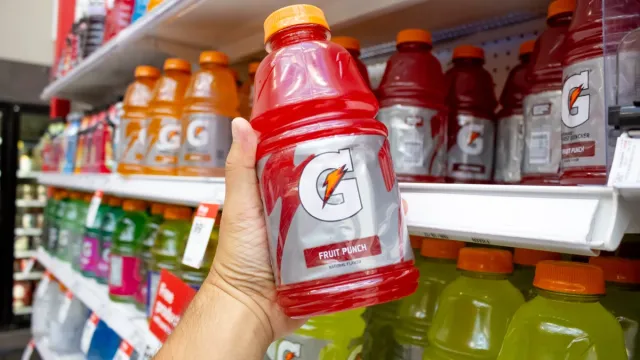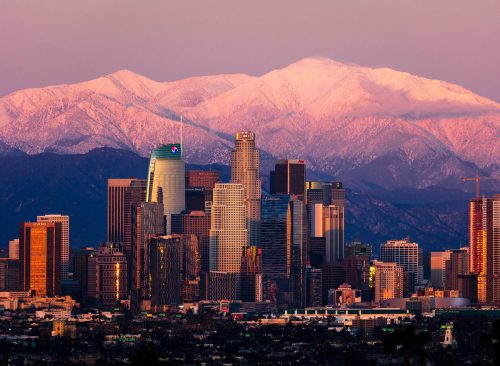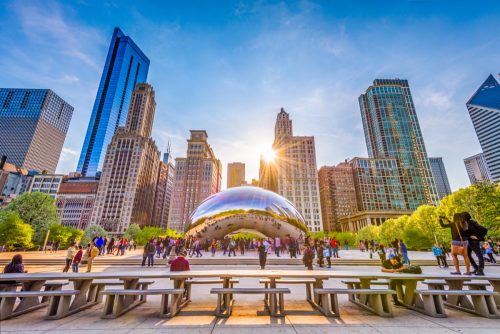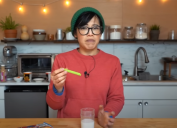New Laws Could Ban Gatorade, M&M's, Froot Loops, and More Popular Snacks
States are working to protect people from potentially dangerous food additives.

Your favorite treats could be in trouble. Officials across the country are currently working to protect Americans from certain chemicals that may be present in some of the most popular snacks. According to recent reports, Gatorade, M&M's, and Froot Loops are just some at the foods at risk, as new laws aim to ban multiple potentially harmful ingredients.
In an April 8 release, Consumer Reports (CR) indicated there are at least 13 food additives being targeted by state laws right now: azodicarbonamide, brominated vegetable oil (BVO), butylated hydroxyanisole (BHA), potassium bromate, propylparaben, titanium dioxide, red dye No. 3, red dye No. 40, yellow dye No. 5, yellow dye No. 6, blue dye No. 1, blue dye No. 2, and green dye No. 3.
Most of these chemicals have already been banned in Europe, but are still allowed to be used in food sold in the U.S. by the Food and Drug Administration (FDA) thanks to a "legal loophole, that allows foods to be classified as 'Generally Recognized As Safe (GRAS)'," per the Environmental Working Group (EWG).
"The FDA's system for ensuring that food additives are safe is broken," Brian Ronholm, director of food safety at CR, said in a statement. "There is no consumer confusion on this issue—they want these chemicals out of foods. But when they see that the FDA has not been able to keep up with the latest research, and also see that the industry is already using substitutes in other countries, they recognize that the states are the only ones trying to protect them from toxic food chemicals right now."
Gatorade products used to contain BVO until PepsiCo agreed to remove the additive in 2013, but several of the brand's products still include chemical concerns such as different color dyes. Cereals like Froot Loops and candies like M&Ms also contain several dyes that are being targeted by the new laws, according to the EWG.
"Many of these widely used chemicals are associated with major health harms, including increased risk of cancer, developmental harm and hormone disruption," the health advocacy organization stated on its website.
Other popular snacks that contain some of these food additives include Skittles, Nerds, Swedish Fish, Lucky Charms, Flamin' Hot Cheetos, and Doritos, the New York Post reported.
But where exactly are these snacks at risk? Read on to learn more about the different states pushing laws to ban these chemicals in popular snacks.
RELATED: Diet Soda Fans, Take Caution: New Study Finds Serious Heart Condition Risk.
1
California

Last year, California actually became the first state to prohibit the use of certain food additives. Governor Gavin Newson signed the California Food Safety Act into law on Oct. 7, CR reported. It bans four chemicals from being used as additives in food and drinks sold or manufactured in the state: BVO, potassium bromate, propyl paraben, and red dye No. 3.
"Signing this into law is a positive step forward on these four food additives until the United States Food and Drug Administration (FDA) reviews and establishes national updated safety levels for these additives," Newsom said in a statement at the time.
But the act won't go into effect officially until Jan. 2027, in order to give companies time to reformulate their products to meet the state's new regulations.
RELATED: Candy Lovers, Take Caution: New Law Bans Ingredient in Skittles, Nerds, and More.
2
New York

Over on the East Coast, New York is making similar moves. Lawmakers in the state recently introduced two new bills targeting certain food chemicals on March 5, EWG reported.
The first bill, Senate Bill 6055A/Assembly Bill 6424A, is aiming to enact a state-level ban on seven of the additives: potassium bromate, propyl paraben, titanium dioxide, BVO, red dye No. 3, BHA, and ADA.
The second bill, Senate Bill 08615/Assembly Bill 9295, isn't proposing any outright ban, but is looking to require companies in the state to disclose when they add any of these chemicals to food and drinks that are considered GRAS.
"New Yorkers deserve the highest level of protection when it comes to the safety of the food we eat," Senator Brian Kavanagh, who helped to introduce the bills, said in a statement. "State law has long included the authority to regulate what goes into our food, but New York has generally deferred to the federal government; such deference is not warranted with respect to these seven additives, which pose significant health risks … This legislation will ensure transparency and permit public scrutiny of food chemical safety."
RELATED: Walgreens and Target Face Cream Has Chemical Linked to Cancer, Research Claims.
3
Illinois

Illinois is also getting closer to potentially banning some food additives. A bill targeting titanium dioxide, BVO, potassium bromate, propylparaben, and red dye No. 3 just passed in the state's Senate on April 18 and is now headed to the House, WGN-TV reported.
If it makes it through, this "measure would ban specific, dangerous food additives from being used in the manufacture, delivery, distribution or sale of food products," the office of Illinois Senator Willie Preston, who introduced the bill late last year, said in a statement to the news outlet.
4
Pennsylvania

Pennsylvania is the latest state to introduce legislation against these food additives. A bipartisan group of lawmakers in the state introduced two bills on March 19 that aim to ban a total of nine toxic chemicals, EWG reported.
The first bill, H.B. 2116, looks to enact a state-level ban of six concerning food dyes: red dyes No. 3 and 40, yellow dyes No. 5 and 6, and blue dyes No. 1 and 2. The second bill, H.B. 2117, is working to do the same for three other chemicals: potassium bromate, BVO, and BHA.





















